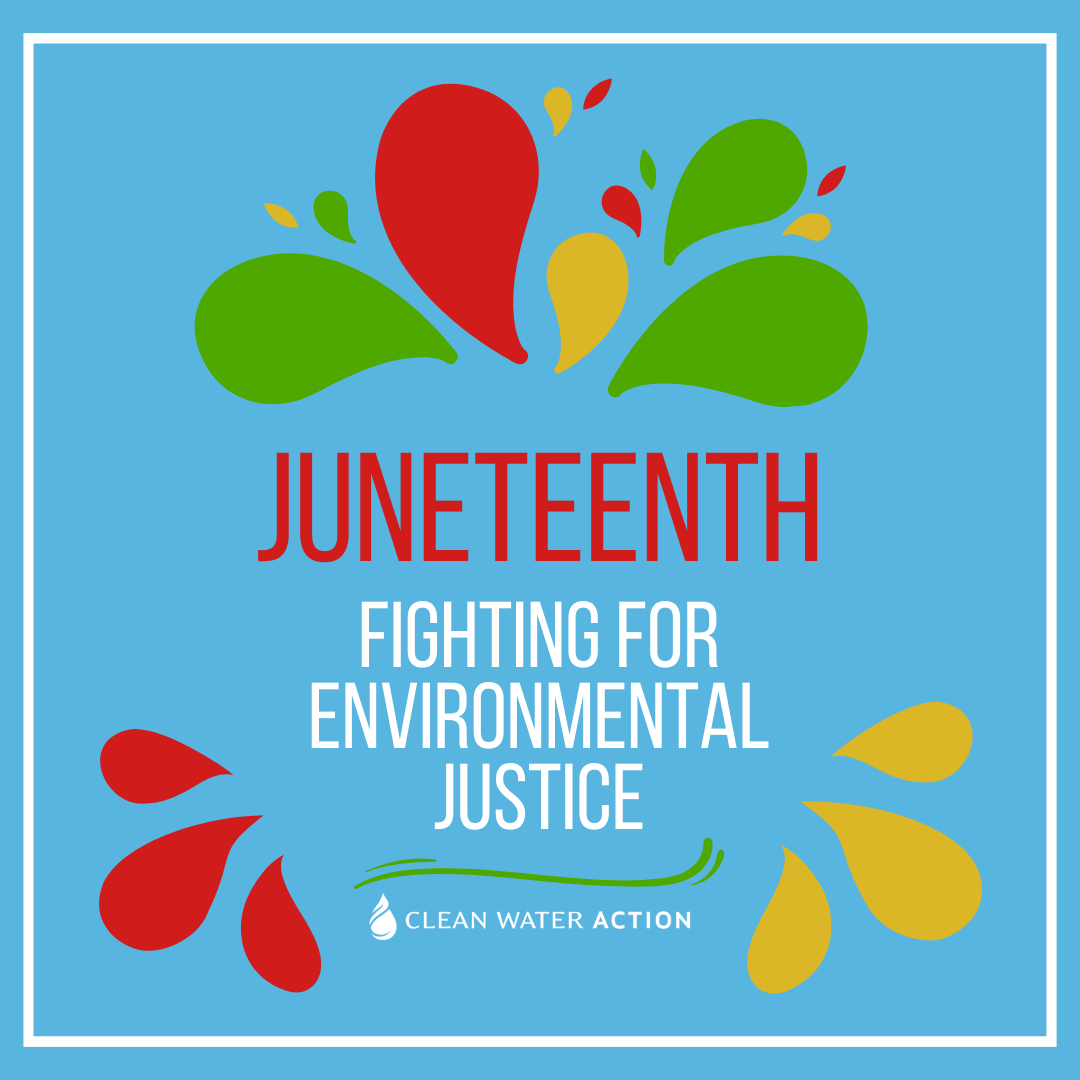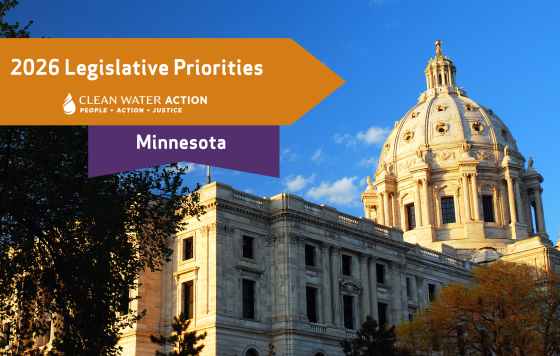
Happy Juneteenth from Clean Water Action! In the U.S., Juneteenth is celebrated as the day that Union soldiers came to inform enslaved Black people in Galveston, Texas that the Union had won the Civil War two years prior and could enforce the end of slavery. While slavery did not actually “end” on this date, it has been celebrated by the Black community as a day of resilience, freedom, and resistance. In 2021, President Joe Biden marked it as a national holiday.
At Clean Water Action, we are celebrating Juneteenth by addressing the intersection between environmental and racial justice on this day and every day. We reflect on the remains of slavery and racial injustice that exist in this country, and work to address the environmental injustice that disproportionately impacts Black, Indigenous, and other communities of color. To celebrate Juneteenth, we are highlighting our Environmental Justice (EJ) programs and the work being done by Black and EJ leaders here at Clean Water Action:
National
On Earth Day, President Biden issued a new Executive Order: Revitalizing Our Nation’s Commitment to Environmental Justice for All. The Executive Order deepens the commitment to a whole-of-government effort. It directs all federal agencies to consider measures to address and prevent disproportionate and adverse environmental and health impacts on communities, including the cumulative impacts of pollution and other burdens like climate change. It also sets up an Office of Environmental Justice within the White House Council on Environmental Quality (CEQ). This executive order enhances our ability to push federal agencies, including the Environmental Protection Agency (EPA), to address aspects of program implementation that perpetuate disproportionate impact. For example, we are analyzing how EPA can improve participation from environmental justice communities in Clean Water Act programs, for example water pollution discharge permitting. We are also assessing the state agencies that oversee the State Revolving Funds, and making recommendations for improvements in transparency and accessibility to ensure that at least 49% of new water infrastructure investment funding goes to disadvantaged communities as required.
California
Much of Clean Water Action’s work in California is centered around addressing environmental issues that disproportionately affect Black and brown communities. This includes working directly in Black and brown communities with our ReThink Disposable program to help and support restaurants in transitioning to more sustainable, environmentally-friendly, and ultimately cost-saving business practices. We also organize in frontline communities in Kern County, where the century-old oil and gas extraction industry continues to disproportionately impact low-income communities of color. We support the Human Right to Water by advocating for investments for the million Californians - predominantly low-income communities of color - that lack access to safe drinking water, and we are developing a statewide low-income rate assistance program to ensure that households do not lose access to drinking water due to an inability to pay. Learn more about our legislative work here.
Connecticut
A top priority for Clean Water Action this year was to pass a bill that strengthens the state's current Environmental Justice law in Connecticut. We participated in a large coalition, led by EJ leaders, to build momentum for a law that authorizes the state's environmental agency to include cumulative impacts in decisions to permit a new facility. The bill also gives residents more opportunities to weigh in on decisions for their communities. We're thrilled that the bill passed on June 9th and will be signed into law!
DC
Clean Water Action in DC is very involved in supporting the Anacostia Parks and Community Collaborative, a coalition focused in DC neighborhoods along the Anacostia River. A major initiative is advocating for more investment and maintenance in the park, which is a national park that does not get the money that other national parks in DC receive.
Maryland
We are facilitators of a robust Environmental Justice coalition in Maryland where we help execute policy campaigns. This year we helped shepherd the Transportation Equity Act, legislation that will require an equity analysis before major changes to transportation projects. In Baltimore City, we continue to push the city to do more to help residents suffering from basement sewage backups while advocating for investments to prevent backups in the future.
Massachusetts
Clean Water Action’s focus is to ground all of our campaigns in Environmental Justice with strong leadership from frontline communities. Our top priority Climate Justice work currently includes pushing to pass An Act to improve outdoor and indoor air quality for communities burdened by pollution, which would expand air monitoring and set new targets for cleaner air in EJ neighborhoods, homes, schools, and businesses. We're also working to pass An Act relative to energy facilities siting improvement to address environmental justice, climate, and public health which would empower EJ communities to fight back against environmental racism and injustice through stricter requirements for companies looking to site new polluting energy facilities and substations, including preparing cumulative impact and EJ statements. If those statements demonstrate negative health impacts or other negative impacts to the EJ community, that polluting facility will not move forward. We're working to reduce the amount of waste that goes into land fills and trash incinerators, often located in EJ communities. Finally we know that policy is only one of the keys to fighting for environmental justice. We need people power! Clean Water Fund is currently engaged in two projects that are working to improve public participation in energy efficiency and water infrastructure update initiatives in EJ communities across Massachusetts. We're hosting community forums and going door to door in partnership with BIPOC, EJ, and grassroots led groups in order to involve EJ residents in programs that can help improve water quality, reduce their carbon footprint, and save money in the process.
Michigan
We continue to assist in leading Michigan’s first-ever Environmental Justice caucus in the state legislature, where the topics of corporate accountability, water affordability, and cumulative impact legislation are being discussed. In April, we launched our statewide campaign in support of comprehensive water affordability legislation that includes a ban on water shutoffs, a cap on water rates for low-income families, and the creation of a water affordability fund. We are leading the energy democracy conversation and continue to organize allies in support of polluter pay and utility accountability. In June, we are focused on ensuring significant climate resilience and water infrastructure funding are included in the state's budget.
Minnesota
This year, Minnesota became the third state to pass cumulative impacts law with the aim to address the disproportionate burden of pollution that frontline communities bear. Once rulemaking is done, this will give significant protections to Environmental Justice communities and empower them to reject permits for polluting facilities in their communities.
New Jersey
As we celebrate Juneteenth, it is critical that we connect the freedom of enslaved Black people to our human right to breathe clean air and access to safe, affordable drinking water. New Jersey passed the first and strongest Environmental Justice Cumulative Impacts Law in the nation. Our Voices Matter! Power to the People and our members for standing up against Environmental Injustices in the United States. As the colors of the Juneteenth Flag reflect, Red stands for struggle and sacrifice. Black to stand for Black People and Green to stand for the natural wealth of the land of Africa. Our fight for Environmental Justice is and will always be connected to the land and people.
Pennsylvania
The Pennsylvania House Environmental Resource and Energy Committee recently took several actions to advance Environmental Justice permitting legislation (HB 652), including voting it out of committee. As part of activity around the bill, our Eastern Pennsylvania Director, Maurice Sampson spoke before a State House Environmental Resource and Energy Committee hearing. Maurice testified that HB 652’s provision for facility permits based on cumulative impact is the legislative gold standard to advance environmental justice and that this legislation will even the playing field for low income and communities of color by valuing health over economics when considering whether or not to grant a permit. The bill is the product of a collaboration between us and State Representative Donna Bullock (D-Philadelphia). It’s modeled after a successful policy that passed in New Jersey. It requires facilities seeking permits to prepare an impact assessment that includes any potential negative impacts their operations may cumulatively have on the environment of surrounding communities as well as empowers the Pennsylvania Department of Environmental Protection (DEP) to deny a permit application if it finds those cumulative impacts would be an added detriment to existing environmental conditions.
Rhode Island
In Rhode Island, Clean Water Action has been supporting legislation that would require all remaining lead service lines in the state to be replaced over the next 10 years. As of the day this was written, the legislation had cleared both House and Senate committees, and is awaiting floor votes in both chambers and likely to pass. This has been a multi-year coalition effort led by allies with the Childhood Lead Action Project. We also advocated this year for the RI Environmental Justice Act which would define EJ areas in state law and give state permitting agencies the ability to consider cumulative impacts in their permitting decisions. This legislation passed the RI State Senate again this year, but again stalled in the House. We will be working with EJ allies and frontline community groups in the coming months to develop a strategy for advancing this bill, or perhaps different EJ legislation, next year.
Texas
In Texas, every state commission comes under review each twelve years, a process known as a “sunset review.” The 2023 docket included our primary environmental agency, the Texas Commission on Environmental Quality, known as TCEQ. Clean Water Action generated comments from our members to their elected leaders, and testified on record before both the Sunset Commission and the House Committee on Environmental Regulation for reforms including: the establishment of an Office of Environmental Justice within the agency; removing “economic development” from the mission of the agency; pressing for higher daily fines for polluting facilities; allowing Commissioners to deny permits based on consideration of cumulative impacts on communities where permits are sought and granted for polluting facilities; and to extend the public input times to increase public participation opportunities for permit and contested case hearings for community members. While the final reforms included in the passage of reauthorization for TCEQ’s next twelve-year cycle lacked many of our desired reforms, higher daily fines for repeat polluting facilities made it across the finish line. We laid important groundwork to push through the agency and subsequent legislative sessions for an Office of Environmental Justice and for the requirement that permit-granting agencies to take into account cumulative impacts on surrounding communities when granting permits for polluting facilities.
Happy Juneteenth! Celebrate with Clean Water Action as we continue to fight for Environmental Justice today and every day.


